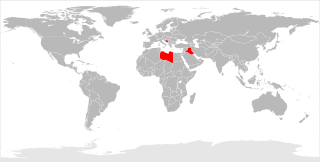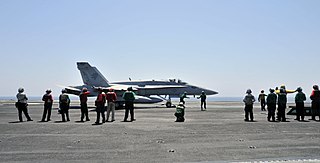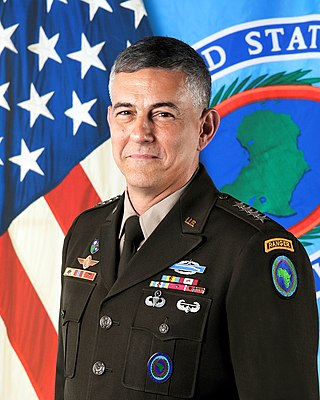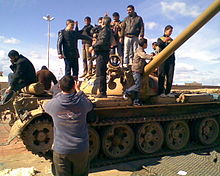
The War Powers Resolution is a federal law intended to check the U.S. president's power to commit the United States to an armed conflict without the consent of the U.S. Congress. The resolution was adopted in the form of a United States congressional joint resolution. It provides that the president can send the U.S. Armed Forces into action abroad only by declaration of war by Congress, "statutory authorization", or in case of "a national emergency created by attack upon the United States, its territories or possessions, or its armed forces".

A no-fly zone, also known as a no-flight zone (NFZ), or air exclusion zone (AEZ), is a territory or area established by a military power over which certain aircraft are not permitted to fly. Such zones are usually set up in an enemy power's territory during a conflict, similar in concept to an aerial demilitarized zone, and usually intend to prohibit the enemy's military aircraft from operating in the region. Military action is employed by the enforcing state and, depending on the terms of the NFZ, may include preemptive attacks to prevent potential violations, reactive force targeted at violating aircraft, or surveillance with no use of force. Air exclusion zones and anti-aircraft defences are sometimes set up in a civilian context, for example to protect sensitive locations, or events such as the 2012 London Olympic Games, against terrorist air attack.

The war on terror, officially the Global War on Terrorism (GWOT), is a global counterterrorism military campaign initiated by the United States following the September 11 attacks and is also the most recent global conflict spanning multiple wars. The main targets of the campaign were militant Islamist and Salafi jihadist armed organisations such as al-Qaeda, the Islamic State, and their international affiliates, which were waging military insurgencies to overthrow governments of various Muslim-majority countries. Other major targets included the Ba'athist regime in Iraq, which was deposed during an invasion in 2003, and various militant factions that fought during the ensuing insurgency.

On 19 March 2011, a multi-state NATO-led coalition began a military intervention in Libya to implement United Nations Security Council Resolution 1973, in response to events during the 2011 Libyan civil war. With ten votes in favour and five abstentions, the UN Security Council's intent was to have "an immediate ceasefire in Libya, including an end to the current attacks against civilians, which it said might constitute 'crimes against humanity' ... [imposing] a ban on all flights in the country's airspace — a no-fly zone — and tightened sanctions on the Muammar Gaddafi regime and its supporters."
The domestic reactions in the United States after the 2011 military intervention in Libya ranged from criticism to support. Unlike the revolutions in Tunisia and Egypt, which were carried out largely without external intervention, the brutal reaction of the Gaddafi regime to the protests that began in January and February 2011 quickly made it clear that the Libyan opposition forces would not be able to achieve political progress or to overthrow their government by themselves. In light of ongoing serious human rights violations, the United Nations Security Council established a no-fly zone over Libya and authorized the member states of the UN to take all necessary measures to protect civilians and civilian populated areas under threat of attack. Two days later, a coalition of states—including the United States, the United Kingdom, and France—began to carry out air strikes against military targets in Libya. By the end of March 2011, NATO had taken over the international military operation in Libya. With the support of NATO, the insurgents successively took power in Libya, gaining control over the capital, Tripoli, in August and over Sirte, the last city held by the Gaddafi regime, in October 2011. During the fights over Sirte, Gaddafi was killed. With the insurgents taking control over most of the country and being recognized as the legitimate (transitional) government of Libya by much of the international community, a change in the Libyan regime has taken place.

In response to rapid territorial gains made by the Islamic State during its 2014 Northern Iraq offensives, universally condemned executions, human rights abuses and the fear of further spillovers of the Syrian Civil War, many states began to intervene against it in both the Syrian Civil War and the War in Iraq (2013–2017). Later, there were also minor interventions by some states against IS-affiliated groups in Nigeria and Libya.

On 22 September 2014, the United States intervened in the Syrian civil war to fight the Islamic State as part of Operation Inherent Resolve in the international war against the Islamic State. The U.S. supported the Syrian rebels and the Syrian Democratic Forces against Syrian president Bashar al-Assad.

Opération Chammal is a French military operation in Iraq and Syria launched to help curtail the expansion of the Islamic State of Iraq and the Levant and to support the Iraqi Army. Its name comes from the Shamal, a northwesterly wind that blows over Iraq and the Persian Gulf states.

Operation Shader is the operational code name given to the contribution of the United Kingdom in the ongoing military intervention against the Islamic State of Iraq and the Levant. The operation involves the British Army providing ground support and training to allied forces fighting against ISIL, the Royal Air Force providing humanitarian aid airdrops, reconnaissance and airstrikes, and the Royal Navy providing reconnaissance and airstrikes from the UK Carrier Strike group and escort to allied carrier battle groups. Additionally, UK Special Forces have reportedly operated in Iraq, Syria, Libya and Tunisia. Elements of the Welsh Guards were deployed to Erbil, Iraq between June and December 2022. In February 2023 the 1st Battalion Grenadier Guards returned from an operational tour in Iraq, under Op Shader and their mission was to provide protection for UK personnel deployed to the Middle East. Small update, inclduing figures on how many Iari Army and Kurdish militia have been trained, within an artilce on a Coldstream Guards officer's tour.

On 15 June 2014, U.S. President Barack Obama ordered United States forces to be dispatched in response to the Northern Iraq offensive of the Islamic State (IS) as part of Operation Inherent Resolve. At the invitation of the Iraqi government, American troops went to assess Iraqi forces and the threat posed by ISIL.

Operation Inherent Resolve (OIR) is the United States military's operational name for the international war against the Islamic State (IS), including both a campaign in Iraq and a campaign in Syria, with a closely related campaign in Libya. Through 18 September 2018, the U.S. Army's III Armored Corps was responsible for Combined Joint Task Force – Operation Inherent Resolve (CJTF—OIR) and were replaced by the XVIII Airborne Corps. The campaign is primarily waged by American and British forces in support of local allies, most prominently the Iraqi security forces and Syrian Democratic Forces (SDF). Combat ground troops, mostly special forces, infantry, and artillery have also been deployed, especially in Iraq. Of the airstrikes, 70% have been conducted by the military of the United States, 20% by the United Kingdom and the remaining 10% being carried out by France, Turkey, Canada, the Netherlands, Denmark, Belgium, Saudi Arabia, the United Arab Emirates, Australia and Jordan.

Combined Joint Task Force – Operation Inherent Resolve (CJTF–OIR) is a multinational military formation established by the U.S.-led international coalition against the Islamic State with the stated aim to "degrade and destroy" the organization. Led by United States Army Central (ARCENT), it is composed of military forces and personnel from over 30 countries.
The February 2015 Egyptian airstrikes in Libya against Islamic State positions in Libya took place on 16 February 2015, and were triggered by a video released by ISIL in Libya a day earlier, depicting the beheading of 21 Coptic Christians from Egypt. Within hours, the Egyptian Air Force responded with airstrikes against ISIL training camps and weapons stockpiles in retaliation for the killings. Warplanes acting under orders from the Libyan government also struck targets in Derna, reportedly in coordination with Egypt.

The German intervention against the Islamic State was authorized on 4 December 2015. The involvement of the country in the Syrian Civil War and the War in Iraq (2013–2017) began with the Bundeswehr mission in Syria and Iraq to combat the terrorist organization Islamic State. The mission was primarily created as a reaction to the November 2015 Paris attacks.

Stephen J. Townsend is a United States Army four-star general who served as Commander United States Africa Command from 26 July 2019 to 8 August 2022. He previously commanded the United States Army Training and Doctrine Command from March 2018 until June 2019 and XVIII Airborne Corps from May 2015 until January 2018.

The American intervention in the Syrian civil war is the United States-led support of Syrian opposition and the Federation of Northern Syria during the course of the Syrian Civil War and active military involvement led by the United States and its allies — the militaries of the United Kingdom, France, Jordan, Turkey, Canada, Australia and more — against the Islamic State of Iraq and the Levant (ISIL) and al-Nusra Front since 2014. Since early 2017, the U.S. and other Coalition partners have also targeted the Syrian government and its allies via airstrikes and aircraft shoot-downs.
On 29 December 2019, the United States conducted airstrikes against Kata'ib Hezbollah's weapons depots and command centers in Iraq and Syria, reportedly killing at least 25 militiamen and wounding 55 more. The U.S. Department of Defense said the operation was in retaliation for repeated attacks on Iraqi military bases hosting Operation Inherent Resolve (OIR) coalition forces, particularly the 27 December 2019 attack on a Kirkuk airbase that left an American civilian contractor dead. Kata'ib Hezbollah, an extremist Shi'ite militia funded by Iran, denied any responsibility for the attacks.

In December 2019, Iraq and the United States began discussing the partial withdrawal of American combat troops from Iraq. In January 2020, during massive protests and following an escalation of tensions between the United States and Iran, the Iraqi Council of Representatives passed a non-binding measure to "expel all foreign troops from their country," including American and Iranian troops. Following the vote, U.S. President Donald Trump initially refused to withdraw from Iraq, but began withdrawing forces in March.














